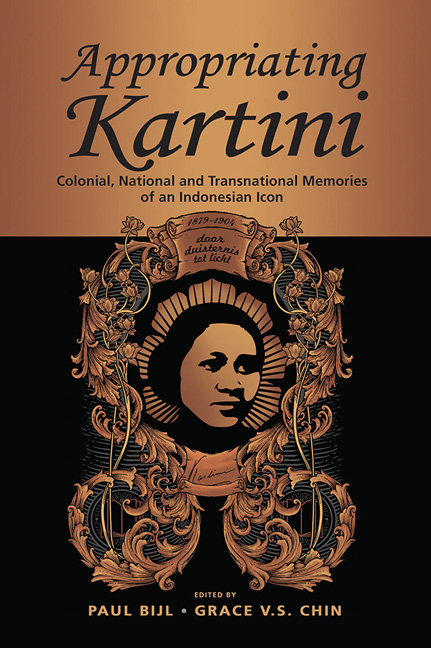Book contents
- Frontmatter
- Contents
- Acknowledgments
- The Contributors
- 1 Introduction
- 2 Crafting Reform: Kartini and the Imperial Imagination, 1898–1911
- 3 Hierarchies of Humanity: Kartini in America and at UNESCO
- 4 Ambivalent Narration: Kartini’s Silence and the Other Woman
- 5 Unpacking a National Heroine: Two Kartinis and Their People 103
- 6 Call me Kartini? Kartini as a Floating Signifier in Indonesian History
- 7 Kartini and the Politics of European Multiculturalism
- 8 Afterword
- Index
5 - Unpacking a National Heroine: Two Kartinis and Their People 103
Published online by Cambridge University Press: 02 April 2020
- Frontmatter
- Contents
- Acknowledgments
- The Contributors
- 1 Introduction
- 2 Crafting Reform: Kartini and the Imperial Imagination, 1898–1911
- 3 Hierarchies of Humanity: Kartini in America and at UNESCO
- 4 Ambivalent Narration: Kartini’s Silence and the Other Woman
- 5 Unpacking a National Heroine: Two Kartinis and Their People 103
- 6 Call me Kartini? Kartini as a Floating Signifier in Indonesian History
- 7 Kartini and the Politics of European Multiculturalism
- 8 Afterword
- Index
Summary
As Head of the Country, I deeply regret that among the people there are still those who doubt the heroism of Kartini…. Haven't we already unanimously decided that Kartini is a National Heroine? (President Suharto in Tempo 1987, p. 23)
On 11 August 1986, as Dr Frederick George Peter Jaquet cycled from Den Haag to his office in Leiden, no one would have guessed that he was transporting an Indonesian national treasure. The wooden box strapped to his bicycle looked perfectly ordinary. When he arrived at the Koninklijk Instituut voor Taal-, Land- en Volkenkunde, the scholar opened the box to view the Institute's long-awaited prize: a cache of postcards, photographs, and scraps of letters sent by Raden Adjeng Kartini and her sisters to the family of Mr J.H. Abendanon, the colonial official who was both her patron and publisher. From this box so grudgingly surrendered by Abendanon's family spilled new light on the life of this Javanese nobleman's daughter, new clues to the mystery of her struggle.
Dr Jaquet's discovery, glowingly reported in the Indonesian press, was but the latest episode in a long series of attempts to liberate Kartini from the boxes which have contained her. For decades, Indonesian and foreign scholars alike have sought to penetrate the veils obscuring the real Kartini in order to reach the core of a personality repressed by colonial officials, Dutch artists and intellectuals, the strictures of tradition, and the tragedy of her untimely death. The promise and the mystery of Kartini have given rise to a fluorescence of questions on all aspects of her life. Why did she give up her plans to go to Holland? Did she really predict her own death? Was she a feminist or a nationalist? Is Indonesia living up to her dreams? President Suharto's pronouncement notwithstanding, Kartini has sparked a conversation which seems unlikely to cease.
Whence the enthusiasm, the obsession with Kartini? From her birth on 21 April 1879 to her death in childbirth in 1904, Kartini scarcely ventured beyond the borders of the community in which she was raised. When she died, she left little behind except a handful of essays and a series of letters written to Dutch pen pals during the last four years of her life.
- Type
- Chapter
- Information
- Appropriating KartiniColonial, National and Transnational Memories of an Indonesian Icon, pp. 103 - 130Publisher: ISEAS–Yusof Ishak InstitutePrint publication year: 2020



